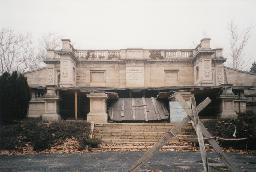Batthyány, Lajos, Count |
| STATESMAN (HUNGARY) |
|
BORN 6 Feb 1806, Pressburg (now: Bratislava) - DIED 6 Oct 1849, Budapest CAUSE OF DEATH executed by firing squad GRAVE LOCATION Budapest: Kerepesi cemetery (19, mausoleum) |
|
Lajos Batthyány was the son of Count József Sándor Batthyány (1777-1812). His mother divorced his father and went to Vienna with him and his brother. He was sent to a boarding school and continued his studies in Zagreb. In 1830 he entered parliament in Hungary and in 1834 he married Antónia Zichy, who stimulated him to become more active in politics Around 1840 he became the leader of the opposition and supported Széchenyi's economical programs. After the dissolution of parliament he moved to Pest and in 1847 he became the president of the Maverick Party. He was a member of the delegation that asked emperor Ferdinanc I for territorial power for the Hungarian government. In March 1848 the emperor gave way and he became the head of the new government. He tried to negotiate between the Austin monarchy and the Hungarian seperatists. He resigned and returned a little bit later and tried to organize a rebellion led by the Palatine. But the Palatine resigned and left Italy. He had organized the Hungarian army and the Croatians were defeated on 29 Sep 1848. But the emperor hadn't recognized his new government and sent Count Franz Philipp von Lamberg to replace him as head of the army. But Von Lamberg was murdered by the rebels on 28 Sep. Batthyány resigned again joined the Hungarian army under József Vidos against the Croatians. He was wounded after he fell from his hore, but after he recovered he was elected again and in January 1849 he was to negotiate with general Von Windischgrätz. But the latter wouldn't talk to him and he returned to Pecs. There he was captured and imprisoned. The Hungarian army wanted to rescue him, but he claimed his actions had been legitimate. On 16 Aug 1849 the Military Court wanted to give him a prison sentence, but Prince Felix of Schwarzenberg insistee that he should be sentenced to death. The Hungarians hoped Julius Haynau would pardon him, but he ordered his hanging instead. His wife managed to bring him a small sword in prison and he tried to kill himself by cutting his jugular veins. The attempt failed and because of his scars he wasn't hung but executed by a firing squad. He was buried at the Greyfriars Church, but in 1870 his remains were transferred to a huge mausoleum at the Kerepesi Cemetery. Related persons • cooperated with Deák, Ferencz • has a connection with Haynau, Julius Jacob, Freiherr von |
Sources • Vórnai, Péter, Budapest Guide, Tourism Office of Budapest, 1999 • Winkler Prins Encyclopedie (editie 1909), 1909 • Lajos Batthyány - Wikipedia (EN) |



